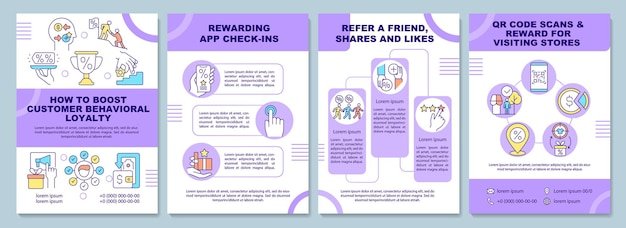In today’s fiercely competitive digital landscape, businesses are constantly striving to find ways to stand out from the crowd. One of the most effective ways to do this is by building a loyal customer base. A loyal customer is not only more likely to make repeat purchases, but they are also more likely to recommend your business to others. In fact, according to a study by Bain & Company, increasing customer retention rates by just 5% can increase profits by 25% to 95%. This highlights the importance of customer loyalty for businesses.
Understanding your customers’ needs and preferences
The first step in building customer loyalty is to understand your customers’ needs and preferences. This can be done through market research, surveys, and customer feedback. By understanding what your customers want, you can tailor your products and services to meet their needs. This will not only increase customer satisfaction but also help to build trust and loyalty. For example, you might discover that your customers really enjoy personalized e-commerce during their shopping experience.
One way to gather customer feedback is through social media. Social media platforms like Facebook and Twitter provide a platform for customers to share their opinions and experiences with your brand. By monitoring social media conversations, you can gain valuable insights into what your customers like and dislike about your products or services. You can then use this information to improve your offerings and build stronger relationships with your customers.
Another way to gather customer feedback is through surveys. Surveys can be conducted through email, social media, or on your website. The key is to keep the survey short and to the point. Ask questions that will provide you with actionable insights into what your customers want and need.
Providing excellent customer service
Providing excellent customer service is essential for building customer loyalty. Customers are more likely to stay loyal to a brand that provides them with a positive experience. This includes everything from answering their questions promptly to resolving any issues they may have.
One way to provide excellent customer service is to have a dedicated customer support team. This team should be trained to handle customer inquiries and complaints in a professional and friendly manner. They should be available through multiple channels, including phone, email, and social media.
Another way to provide excellent customer service is to personalize the customer experience. This can be done by using the customer’s name in communications, offering personalized recommendations based on their purchase history, and sending personalized thank-you notes after a purchase.
Creating a loyalty program
A loyalty program is a great way to incentivize customers to make repeat purchases. It rewards customers for their loyalty and encourages them to continue doing business with your brand. A loyalty program can take many forms, including points-based systems, tiered rewards, and exclusive discounts.
One example of a successful loyalty program is Starbucks Rewards. The program rewards customers with points for every purchase they make, which can be redeemed for free drinks and food items. The program also offers exclusive discounts and personalized offers to members.
Personalizing the customer experience
Personalizing the customer experience is another effective strategy for building customer loyalty. Customers are more likely to feel connected to a brand that understands their individual needs and preferences. This can be done through targeted marketing campaigns, personalized recommendations, and customized product offerings.
One way to personalize the customer experience is through email marketing. By segmenting your email list based on customer preferences and purchase history, you can send targeted emails that are more likely to resonate with the recipient. You can also use dynamic content in your emails to personalize the message even further.
Another way to personalize the customer experience is through product recommendations. By analyzing a customer’s purchase history and browsing behavior, you can recommend products that are relevant to their interests. This not only helps to increase sales but also shows the customer that you understand their needs.
Amid the strategies to bolster customer loyalty, generating solar leads has emerged as a lucrative venture. Tapping into the sustainable energy market, especially solar solutions, provides businesses with a unique edge. By generating quality solar leads, companies not only expand their customer base but also underscore their commitment to sustainable practices, elevating customer trust and loyalty.
Building a strong company culture
Building a strong company culture is essential for building customer loyalty. Customers are more likely to do business with a brand that shares their values and beliefs. This includes everything from your company’s mission statement to the way you treat your employees.
One way to build a strong company culture is to involve your employees in decision-making processes. This not only makes them feel valued but also gives them a sense of ownership in the success of the business. You can also offer training and development opportunities to help your employees grow both personally and professionally.
Another way to build a strong company culture is to give back to the community. This can be done through charitable donations or volunteer work. By showing that your brand is committed to making a positive impact, you can build trust and loyalty with your customers.
Case studies of successful customer loyalty strategies
There are many examples of businesses that have successfully implemented customer loyalty strategies. One example is Amazon Prime, which offers free two-day shipping and exclusive discounts to members. The program has been incredibly successful, with over 200 million members worldwide.
Another example is Nike’s loyalty program, NikePlus. The program offers members exclusive access to new products, personalized workouts, and free shipping. Members also earn points for purchases, which can be redeemed for rewards like free shipping and discounts.
Measuring the success of your customer loyalty efforts
Measuring the success of your customer loyalty efforts is essential for determining what is working and what needs improvement. There are several metrics you can use to measure customer loyalty, including customer retention rate, net promoter score, and customer lifetime value.
Customer retention rate measures the percentage of customers who make repeat purchases. A high customer retention rate indicates that your customers are loyal and satisfied with your products or services.
Net promoter score measures how likely your customers are to recommend your brand to others. A high net promoter score indicates that your customers are loyal and happy with your brand.
Customer lifetime value measures how much revenue a customer generates over the course of their relationship with your brand. A high customer lifetime value indicates that your customers are loyal and make repeat purchases.
Common mistakes to avoid when building customer loyalty
There are several common mistakes that businesses make when trying to build customer loyalty. One mistake is to focus too much on acquiring new customers at the expense of existing ones. It is important to remember that retaining existing customers is often more cost-effective than acquiring new ones.
Another mistake is to neglect customer feedback. Listening to your customers’ opinions and concerns is essential for building trust and loyalty. Ignoring customer feedback can lead to a loss of trust and loyalty.
Finally, businesses often make the mistake of offering generic rewards or discounts. Customers are more likely to be loyal to a brand that offers personalized rewards and incentives.
Conclusion
Building customer loyalty is essential for the success of any business. By understanding your customers’ needs and preferences, providing excellent customer service, creating a loyalty program, personalizing the customer experience, and building a strong company culture, you can build a loyal customer base that will be an asset to your business for years to come. Remember to measure the success of your efforts and avoid common mistakes like neglecting customer feedback and offering generic rewards. By implementing these strategies, you can create a strong connection with your customers and drive revenue for your business.
















